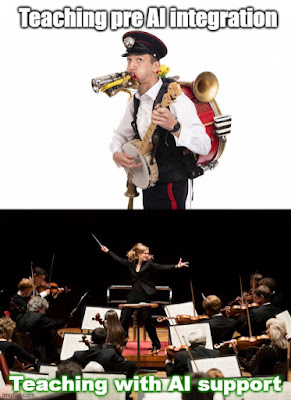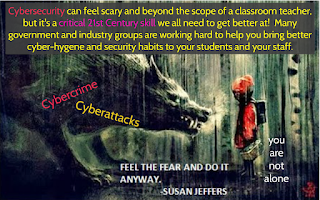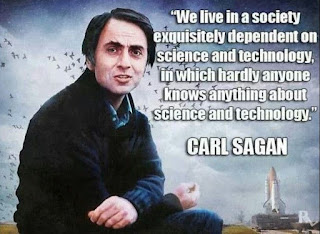All sides are going to drag their feet for as long as they can with the new teacher contracts in Ontario. I'd certainly like my pay to keep up with inflation, but that hasn't happened in any time recently, so I'm not sure why it should be a show stopper now. My buying power, even with the sub-par increases we've eked out, is significantly less than it was in 2010. This isn't a 'this government' thing - the last one was pretty good at making us poorer each time too. The difference these days is that this one also likes to cripple learning conditions.
A problem with how we get to a contract in Ontario is that you'd be lucky to find anyone at the table who has been in a classroom teaching recently. Most professional unionists have levitated out of classroom teaching, in some cases for decades. On the other side of the table there is most likely no one who has ever taught a day in their lives. These are the people deciding teaching working conditions and student learning conditions in our schools.
I'm already out of pocket significantly, so another 1% per year raise isn't going to do much, but I know where resources could be put that would make a difference both to myself as a teacher and to my students as learners. I'd accept a three year deal that gets us to the end of this provincial government's mandate with NO RAISE, but only if we also did the following:
1) Reduce Ontario College of Teacher fees back to prepandemic levels and freeze them there for the duration of this 'we don't get a raise so you don't either' contract.
2) Restore public education funding to prepandemic levels. In 2021, while COVID droned on, almost a billion dollars was cut from education in our province. Restore that.
That gets us back on an even keel by removing the system damaging politics that have withered public education in Ontario. With the politics deflated, lets look at how we can make the system more efficient so that we can maximizing our funding and produce better learning outcomes. I suspect many teachers would be willing to focus on improving our classroom learning because student learning conditions are also our working conditions.
Here are some ways to shake the tree and put the focus back where it belongs (...with kids' learning? ...in classrooms? No?).
3) THE FLUSH: Any teacher past retirement age is welcome to stay on, but they aren't seconded and doing office work in a board or ministry or elsewhere. I've seen too many 'teachers' who are collecting top tier teacher pay who haven't taught in a classroom in years (sometimes in decades). In many cases they are doing 'support', but how can you possible support a classroom that you have no experience in? If the last time you taught was in 2007, you have no idea how much things have changed no matter how well intentioned you may be.
3.1) THE FLUSH Part 2: make cross training is the point of curriculum support. No more life-time non-teaching roles for teachers. Every teacher can have a two year secondment to curriculum support, but must be back in the classroom for two years before being able to apply for another one. This would go far to end the nepotism and favouritism that defines many of these roles.
This focus on classroom familiarity includes vice principals. They should be teaching one class a year. You could then have more VPs in training in schools with the money saved. Cross training and future career progression should be the focus of curriculum support and junior administration roles.
4) THE REBOOT: do the maths. With this many resources on the table (restored funding, no extra money needed for raises, expensive senior teachers retiring etc), what could we do to bring class sizes down? If you told classroom teachers that their class caps are all dropping by 20% in the new contract, I imagine they'd be very happy. No one wants to lose kids in need in overcrowded classrooms. I suspect classroom teachers would be thrilled with this approach, but they aren't the ones at the table.
4.1) REBOOT part 2: as part of class size restructuring, include multipliers for students with special needs. If I have a class cap of 24 students, none of whom have special needs, the learning will be equitable and the class manageable. If I have a class with ten students with special needs and they are weighted (for example, a student with high needs might weighted as a 2.2 in their IEP under the new, lower class caps), then the class cap wouldn't be 24. That 2.2 student alone would lower the class cap to 23 and other IEP students would lower it further. Quality of learning is maintained because we've focused greater attention where it's needed.
We currently have an Individual Learning Plan (IEP) system that is vague about students with special needs and offers little in terms of in classroom support. If you want students to learn productively (especially in destreamed classes), and good teachers to stay in the profession, include mechanisms that automatically reduce class sizes for students with special needs so that teachers can do what they are trained to do: help. Watching the system systemically work against that goal is one of the saddest things about teaching in Ontario these days.
5) Give classroom teachers time for professional development and improve their practice. PD has died in Ontario education in the past couple of years. The Great Squeeze has chased many teachers away from the profession and created a shortage. Encourage young teachers and potential new ones to come back to the profession while looking after them as they develop best practices. Currently classroom teachers are in such short supply that teachers are given no time to improve their practice. It's demoralizing.
6) Offer earlier retirement. Teacher retirements haven't changed in years. The pension fund is healthy. If it can offer tired pre-retirement teachers who have fought their final years through COVID and plummeting work quality a way out, then it should. The system benefits from this as senior teachers with maximum qualifications make more than twice what a new teacher with beginning qualifications does. You'd think senior teachers would be helping junior teacher training (they do, but they aren't compensated for it). The people who are compensated for training teachers often have only a fraction of the classroom experience needed to do the job (see #7).
7) Honour classroom specialists by giving them time to support newer teachers. My last two teaching reviews were done by administrators with less than a quarter the classroom teaching experience I've had. I've worked with classroom specialists who are Jedi masters in terms of classroom and learning management, but they never get a look in on teacher training or reviews. Honouring expertise in education from actually working in classrooms isn't something that happens, but it should. The education org chart is remarkably rigid and, frankly, quite top heavy. Teachers who pass into support or administration roles can find themselves reviewing and supporting teachers who have done the job for 10x longer than they ever did.
It's the combination of worsening learning/working conditions and pay cuts for years on end that have driven many away from teaching in Ontario. Smaller caps with even lower limits for classrooms with high needs learners makes destreaming make some kind of pedagogical sense instead of being used as an excuse to stuff more kids into a room in the name of equity. Many students in non-academic streams aren't less capable, but they are struggling with learning challenges, so modifying class caps to focus more teacher attention in classes with these students seems obvious, yet it has never happened other than in streaming, which we're in the process of phasing out.
This round of contracts will end up being whatever it ends up being - classroom teachers won't have much say in it, but it'd be nice if Ontario decided that reasonable funding focused on smaller classes with more equitable learning outcomes for a wider range of students is something we could all get behind. Would I like to just once not get a pay cut thanks to inflation? Sure, but it isn't likely any time soon. In the meantime, focus resources on improving learning conditions (which are also teacher working conditions).




















.JPG)





.jpg)